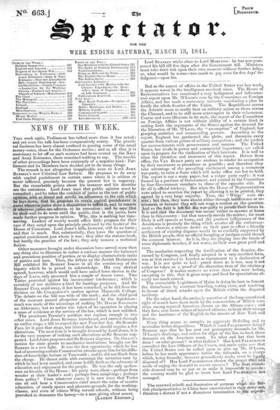Bad as the aspect of affairs in the United States
was last week, it appears worse in the intelligence received since. The House of Representatives has sanctioned a very belligerent and inflamma- tory report upon Mr. M‘LEon's case by the Committee on Foreign Affairs, and has made a movetuent towards sanctioning a plan to fortify the whole frontier of the Union. The Republicans across the Atlantic seem as madly bent on military action as those across the Channel, and to be still more extravagant in their vehemence. Coarse and even illiterate in its style, the report of the Committee on Foreign Affairs is not without ability of a certain kind, its setting forth the arguments of the States against the demand for the liberation of Mr. M‘LEon, the "assumption" of England, her grasping ambition and commanding posture. According to the report, England has garrisoned the globe, and threatens every quarter from various points of military occupation ; and she pushes her encroachments with perseverance and success. The United States, her rivals in power and commercial importance, are called. upon to prepare for the vindication of their interests. It is well to trace the intention and treatment of this report. Driven from office, the VAN BUREN party are anxious to render its occupation by their successors as precarious as possible ; and therefore they take advantage of the prevailing excitement among a numerous war-party, to raise a flame which will make office too hot to hold. The report is not a state paper, but a vulgar party squib : it was framed by a partisan of Government, and carried in the Committee by four Government members to three of the opposite side. So far all is official trickery. But when the House of Representatives were asked to sanction the report by allowing it to be printed, they agreed by a very large majority. True, the " Whigs ' were ab- sent; but then, they were absent either through indifference or re- missness, or because they will not wawa contest on the question. And so the field is left for -the war-party to parade their forces in. It is said that the document was meant rather to operate at home than in this country : but that scarcely mends the matter; for most likely it will operate at home, and the prurient belligerence of the Americans is precisely the thing which creates all the embarrass- ment; whereas, a: sincere desire on their part to effect a friendly settlement of existing disputes would be so cordially supported by the British people, that no official bungling or intrigue could thwart the common interest. As it is, they are playing into the hands of' some diplomatic botcher, if not worse, to their own great peril and
Ours.
The resolution respecting the fortification of the frontier, dis- cussed by Congress' and finally adopted in a very modified form,
was at first received in London as tantamount to a declaration of
war. It is not quite so bad : pared down as it was, may it not rather be taken as a proof of the discretion than of the obstinacy
of Congress ? It makes matters no worse than they were before, excepting in this, that it gives scope and food for speculations al- ready too much roused.
The untractable Legislature of Maine is doing its best to foment the disturbance by constant brawling' voting sums, and resolving in favour of direct attacks upon the British within the disputed territory.
On the other hand, the untimely assertion of the long-questioned right of search have been made by the commanders of British war-
ships among reputed American slavers on the African coast ; and they have sent home relays of injured citizens, to bruit their wrongs and the insolence of the English in the streets of New York and Boston.
Every thing seems to conspire to aggravate ill-feeling and to neutralize better dispositions. Which is Lord PALMERSTON doing ? Rumour says that he has sent out peremptory demands for Mr. M‘LEon's discharge, and orders for ships of the line to back those demands on the American coast. To what end has that been done ? on what ground ? in what fashion ? Has Lord PALMERSTON consulted the Law Officers of the Crown, and made quite sure that the United States can be called upon to give up Mr. M‘LEoto, before he has made appearance before the tribunals, on a charge which, being formally, however groundlessly made, must be hs„alig disposed of? Has Lord PALMERSTON chosen the proper ,siCol -and mode of urging the demand to secure success ? The rAoit reason- tai able demand may be so put as to make it impossiblt to accede: the country would be glad to know how Lord PALgERSTON has managed.


























